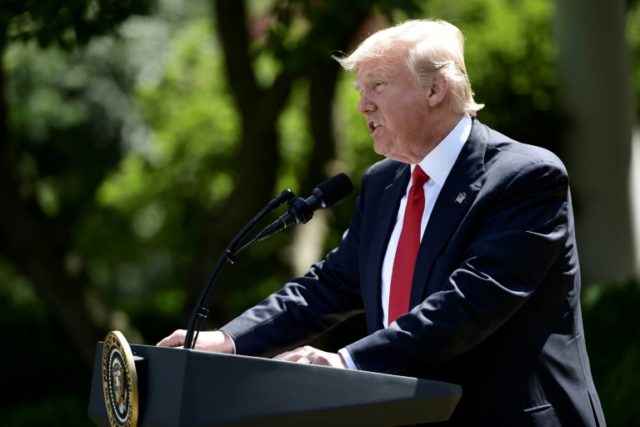The United States is again dangerously “out of step” with world opinion. It has happened many times since 1776, but not often enough.
President Trump announced on Thursday the U.S. is withdrawing from the December 2015 Paris accords on climate change. It was not only the right thing to do, it was so obviously the only thing to do that the virulent criticism of his decision paints a dark picture of how far leftward “elite opinion” in our country has drifted.
The reasons for the president’s rejection of the Paris accords are both numerous and persuasive— if you put American interests and American jobs first instead of last. The single most important reason ought to be sufficient: the accords could never have been ratified by the Senate if Obama had followed the Constitution and submitted the agreement as a treaty requiring a two-thirds vote for approval. Can you imagine the outcry at the New York Times and CNN if Trump tried to adopt an international agreement on anything by simply calling it an accord and not a treaty?
Trump’s rejection of the Paris accords should not be such a big surprise, considering that he made a campaign promise to do it. That we are surprised each time he keeps a campaign promise shows the extent of public cynicism after the presidencies of Obama, two Bushes, and Clinton. Remember Bill Clinton’s promise in his 1993 State of the Union speech that, “The era of big government is over.” Yeah, right, and there would be “no new taxes” according to Bush 41’s lips.
Presidents are now keeping their promises? It will take a while to adjust to that especially radical climate change. But what we have seen from the Democrats and climate change activists is passionate outrage, not surprise. It’s almost as if Trump had insulted their religion, not their precious, unratified international treaty.
Sixty-one mayors and three Democrat governors, in California, Washington, and New York, immediately pledged to implement the Paris accords regardless of what the federal government does, and others will likely follow.
Colorado’s Democrat Governor John Hickenlooper inadvertently gave additional credibility to one of President Trump’s main reasons for withdrawing from the international agreement: Trump said we do not need 190 other nations and meaningless targets for the year 2100 to tell us when to pursue our own clean air policies. Hickenlooper condemned the Trump decision but said Colorado will continue its decade-old clean air policies. Good for Colorado — if those policies are supported by the people of Colorado, not the people of Canada, Cairo, and Ceylon.
The critics‘ hysteria is exceeded only by their hyperbole. If Trump reverses the American participation in the Paris accords, he would be rejecting the “turning point for the world,” according to Obama. Trump is “abandoning America’s leadership position,” according to Speaker Pelosi. Rejecting the Paris accords is “reckless and indefensible,” says Al Gore.
Perhaps the most apt description of the extremist rhetoric attacking the President’s decision was by Mark Steyn, who marveled at the left’s fanciful belief that while we can’t control our borders we “can control the heavens.”
Hardly any issue divides Americans politically as much as attitudes toward climate change. A September 2016 Pew Research Center report documented the deep divide on climate change policies among Republicans and Democrats. The Pew survey found that while 69 percent of Democrats believe climate change is both real and caused mainly by human activity, only 23 percent of Republicans believe that.
Thus, Trump’s decision this week to keep his campaign promise and withdraw from the Paris agreement is gaining widespread support among both his Republican base and Republican lawmakers. Trump’s outspoken opponents on this issue in the business sector and the media should not be so shocked by the choice of main street over Wall Street– and American interests over that mythological and impotent force called, euphemistically, “world opinion.”

COMMENTS
Please let us know if you're having issues with commenting.